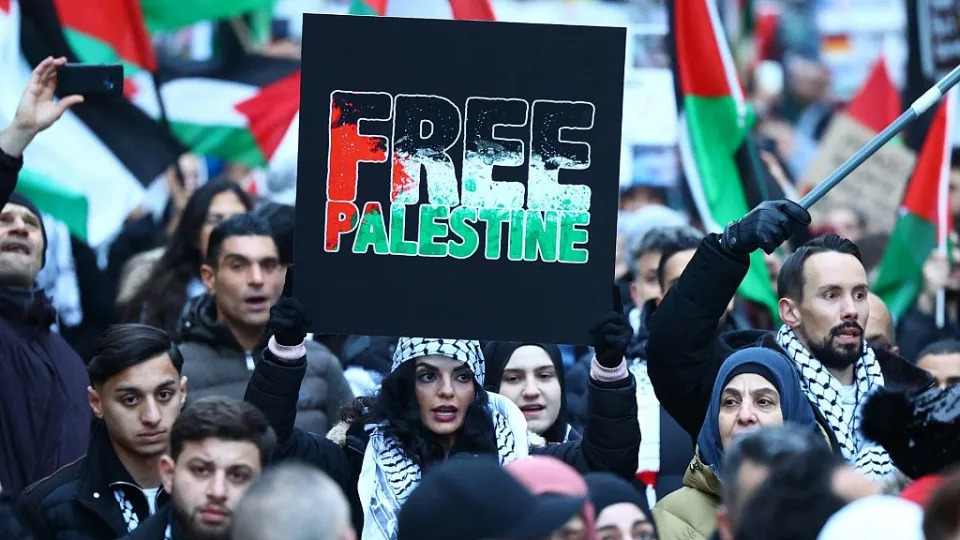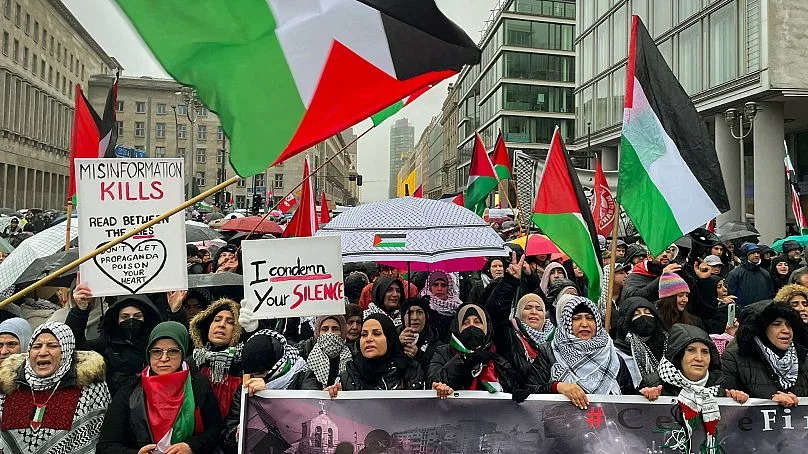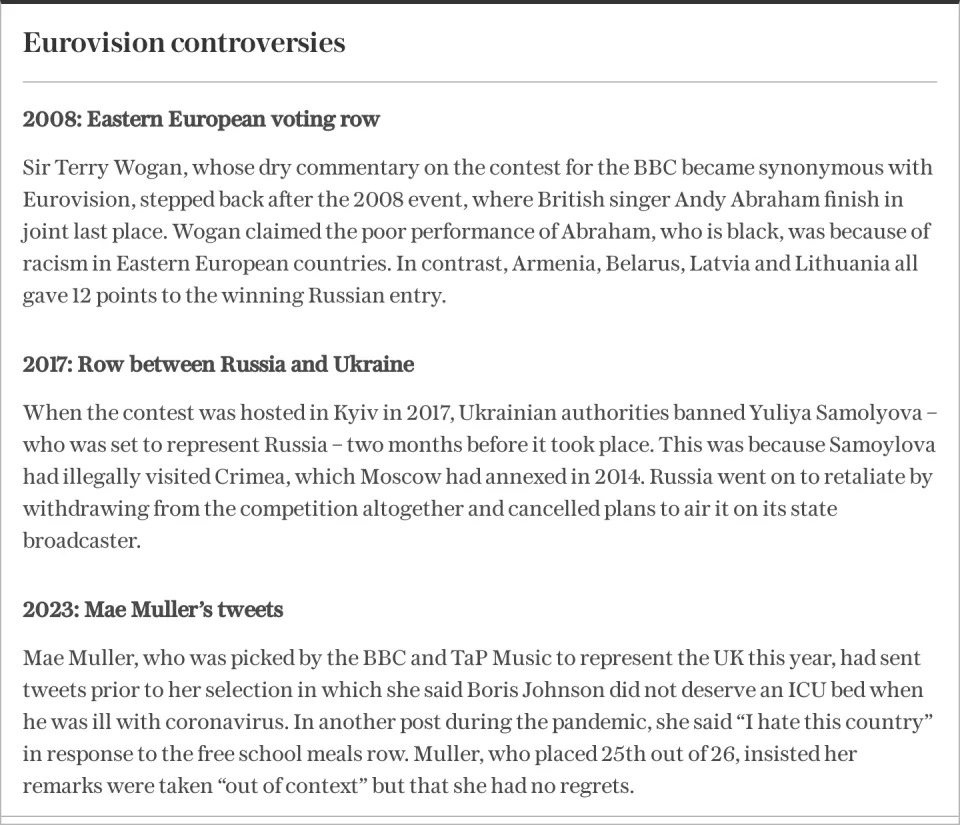ZIONIST KANCEL KULTURE
German cultural institutions turn on pro-Palestinian voicesJonny Walfisz
Wed, 20 December 2023

This November in Berlin, Oyoun, a cultural institution that “conceives, develops and implements artistic-cultural projects through decolonial, queer * feminist and migrant perspectives,” lost its state funding.
The decision is believed to have followed Oyoun running an event for Jewish Voice for a Just Peace in the Middle East, a Jewish-led organisation that has supported the Boycott, Divestment, Sanctions (BDS) movement against Israel. In 2019, Germany’s Bundestag classified the BDS movement as antisemitic.
Oyoun’s funding was set to last until 2025 but the venue will now be left destitute by the end of December this year. It’s not the first cultural institute to face challenges over support for Palestine during a conflict that has seen over 20,000 Palestinians and over 1,200 Israelis killed with over 200 kidnapped in the 7 October assault.
'Peace, please': How European street artists are reacting to the Israel-Hamas war
Eight films to better understand the Israeli-Palestinian conflict
The Frankfurt Book Fair cancelled a prize giving ceremony for Palestinian-born and Berlin-based writer Adania Shibli in October, a decision that Shibli says was not made with her consent.
The German Photography Biennale cancelled its March 2024 tour after the host cities, Mannheim, Ludwigshafen and Heidelberg, took issue with co-curator, Bangladeshi photojournalist Shahidul Alam’s social media content.
Alam had posted antisemitic content, including an “uncommented interview by Shahidul Alam with the Palestinian ambassador to Bangladesh, a comparison of the current war with the Holocaust and accusations of genocide by the state of Israel against the Palestinian population in Gaza. Racist and other comparable comments, e.g. with terrorist imagery directed against the Israeli civilian population (paragliders with weapons),” wrote the Biennale in a statement.
After Alam refused to delete these posts, the Biennale hosts say the “relationship of trust” was damaged. Bangladeshi co-curators, Tanzim Wahab and Munem Wasif, resigned in solidarity and the tour was cancelled.

A demonstrator holds up a placard with the lettering 'Germany is on the wrong side of history again' during a rally in solidarity with Palestinians at Oranienplatz, Berlin - AFP
Alam has since told Al Jazeera that “I am an anti-Zionist which means I am against colonialism, settler colonialism, against racism, against apartheid and genocide.” He notes he is “not an anti-Semite, and it’s most unfortunate that Germany chooses to conflate the two, [as this] serves and furthers the white supremacist agenda.”
A similar situation played out for Haitian-born writer, professor, and curator Anaïs Duplan when his collaboration with the Museum Folkwang in Essen was suspended following their social media posts in support of BDS.
The museum cancelled the 24 November show and explained: “This decision was made neither for artistic-curatorial reasons nor because of the exhibition’s theme, but solely because the curator personally takes sides with the BDS campaign, which questions Israel’s right to exist.”
The Berlin government has also banned Palestinian flags and kaffiyeh scarves from schools. Alongside the moves from prominent cultural institutions, there has been little room in Germany for open discussion of the conflict that promotes the voices of Palestinians representing those suffering a humanitarian crisis in Gaza.

Palestinian flags are seen during a pro-Palestinian rally in central Berlin on December 10, 2023. - AFP
Berlin-based Jewish writer Deborah Feldman spoke to The Hill about the difficulty of discussing Israel-Palestine with Germans. “Germans tend to cut off any attempt at constructive conversation with the much-favoured phrase that that topic is ‘much too complicated’.”
Over 100 Jews in Germany's culture sector signed a petition to condemn how Germany has dealt with pro-Palestinian expression.
It’s no surprise, given Germany’s longstanding attempt to rectify past atrocities against Jewish people, that the country would take a staunch pro-Israel view.
“Germans defending the restrictions note that the country has a less permissive stance on free speech than many democracies for subjects beyond Israel, a legacy of World War II and how the Nazis exploited the democratic process to seize power," writes Erika Solomon for the New York Times. "Holocaust denial is illegal, for example, as are slogans that directly avow National Socialism.”
However, treating the – increasingly internationally recognised as inhumane – actions of the IDF as sacrosanct is not the same as fighting antisemitism.
A blanket ban on artistic voices concerned about the treatment of Palestinian people caught in the current violence isn’t just unhealthy for a culture sector, it’s fundamentally undemocratic.
SPEAKING TRUTH TO POWER
BBC urged to sack Eurovision entrant who called Israel an ‘apartheid state’
Dominic Penna
Thu, 21 December 2023

Olly Alexander has faced calls by a Jewish charity to be replaced over his comments
BBC urged to sack Eurovision entrant who called Israel an ‘apartheid state’
Dominic Penna
Thu, 21 December 2023

Olly Alexander has faced calls by a Jewish charity to be replaced over his comments
- Gus Stewart/Redferns
The BBC has been urged to drop Britain’s entrant at next year’s Eurovision Song Contest after it emerged he had signed a letter calling Israel an “apartheid regime” and criticising “Zionist propaganda”.
Olly Alexander, who was announced as the UK entrant by the national broadcaster last week, endorsed a statement by an LGBT charity that also accused the country of genocide, The Telegraph can reveal.
On Wednesday, the Conservative Party accused the BBC of “either a massive oversight or sheer brass neck” by selecting Alexander, who found fame in pop band Years and Years. A Jewish charity called for him to be replaced and anti-Semitism campaigners demanded the corporation cut ties with him altogether.
However, The Telegraph understands the BBC does not plan to take any action because Alexander signed the letter before he was unveiled as the UK’s act.
The BBC has been heavily criticised for its coverage of the ongoing Israel-Gaza conflict, during which it has refused to refer to Hamas as “terrorists”.
Israel first participated in Eurovision in 1973. It has won four times, and its entry next year has already prompted a boycott of the contest from pro-Palestinian activists.
The statement signed by Alexander was co-ordinated by Voices4 London, an LGBT “direct action” pressure group. It was published on Oct 20 amid the ongoing Israeli military response to the Oct 7 terror attacks carried out by Hamas.
It said: “We are watching a genocide take place in real time. Death overflows from our phone screens and into our hearts. And, as a queer community, we cannot sit idly by while the Israeli government continues to wipe out entire lineages of Palestinian families.
“We cannot untangle these recent tragedies from a violent history of occupation. Current events simply are an escalation of the state of Israel’s apartheid regime, which acts to ethnically cleanse the land.
“Since the violent creation of the state 75 years ago, the Israeli military and Israeli settlers have continued to terrorise Palestinian people.”
Israel ‘a queer issue’
The group claimed that solidarity with the Palestinian territories – where same-sex activity between men is criminal with a maximum penalty of 10 years’ imprisonment – was a “queer issue” because oppression was “rooted in the same violent structures – colonialism, imperialism, and capitalism”.
Alexander, who is gay and starred in the drama It’s a Sin about the 1980s Aids crisis, has vowed to fly the flag for the UK “in the gayest way possible” after his selection was confirmed on Saturday.
The letter continued: “Queer and trans Palestinians have long highlighted that pinkwashing plays a significant role in Zionist propaganda… We stand against any and all harassment and discrimination against Jewish communities.
“For the many queer and anti-Zionist Jewish individuals invested in liberation, this unthinking philosemitism, which hesitates to criticise an ongoing genocide out of fear of being seen to criticise Jewish people, is simply the other face of anti-Semitism”.
Anti-Zionism is the denial of the state of Israel, while philosemitism refers to an interest in and appreciation of Jews – particularly their history and influence – but was used as a pejorative term in Nazi Germany to describe positive sentiments.
Alexander and the BBC came under fire over his remarks on Wednesday. A Conservative Party source said: “Letting an openly anti-Israel singer compete on the same stage as Israel is either a massive oversight or sheer brass neck from the BBC.
“After they refused to call Hamas a terrorist organisation, you would think BBC bosses would try to steer clear of causing any more diplomatic blunders.
“Maybe it’s time to stop letting the BBC decide who represents the UK at Eurovision.”

Alexander’s comments represent the second Eurovision impartiality row this year after Mae Muller, who sang for Britain in Liverpool in May, posted tweets prior to her selection that attacked Boris Johnson and the Conservatives over a range of issues.
Muller said Mr Johnson did not deserve an ICU bed when he was ill with coronavirus, attacked the Conservatives over the free school meals row and campaigned for Jeremy Corbyn, the former Labour leader.
Campaign Against Antisemitism, a volunteer-led Jewish charity, insisted the BBC “can and must” cut ties with Alexander.
A spokesman for the group told The Telegraph: “The rhetoric in this letter, which is seemingly endorsed by Olly Alexander, is extreme. It is appalling in particular that it condemns ‘unthinking philosemitism’.
“At a time when nearly seven in 10 British Jews feel afraid to express their identity in public, this must not be the person to represent our country at the Eurovision Song Contest. The BBC can and must right this wrong.”
Alexander, who topped the charts in 2015 as part of Years and Years with their song King, has been vocal about his sexuality and LGBT rights, making a speech on stage about discrimination during his Glastonbury performance in 2019.
He has previously presented a documentary, Growing Up Gay, for the BBC, and said he felt “horrified” about the attitudes of people like Piers Morgan, who is gender critical, towards transgender people.
The BBC declined to comment. A representative for Alexander and Voices4London were contacted for comment.
The BBC has been urged to drop Britain’s entrant at next year’s Eurovision Song Contest after it emerged he had signed a letter calling Israel an “apartheid regime” and criticising “Zionist propaganda”.
Olly Alexander, who was announced as the UK entrant by the national broadcaster last week, endorsed a statement by an LGBT charity that also accused the country of genocide, The Telegraph can reveal.
On Wednesday, the Conservative Party accused the BBC of “either a massive oversight or sheer brass neck” by selecting Alexander, who found fame in pop band Years and Years. A Jewish charity called for him to be replaced and anti-Semitism campaigners demanded the corporation cut ties with him altogether.
However, The Telegraph understands the BBC does not plan to take any action because Alexander signed the letter before he was unveiled as the UK’s act.
The BBC has been heavily criticised for its coverage of the ongoing Israel-Gaza conflict, during which it has refused to refer to Hamas as “terrorists”.
Israel first participated in Eurovision in 1973. It has won four times, and its entry next year has already prompted a boycott of the contest from pro-Palestinian activists.
The statement signed by Alexander was co-ordinated by Voices4 London, an LGBT “direct action” pressure group. It was published on Oct 20 amid the ongoing Israeli military response to the Oct 7 terror attacks carried out by Hamas.
It said: “We are watching a genocide take place in real time. Death overflows from our phone screens and into our hearts. And, as a queer community, we cannot sit idly by while the Israeli government continues to wipe out entire lineages of Palestinian families.
“We cannot untangle these recent tragedies from a violent history of occupation. Current events simply are an escalation of the state of Israel’s apartheid regime, which acts to ethnically cleanse the land.
“Since the violent creation of the state 75 years ago, the Israeli military and Israeli settlers have continued to terrorise Palestinian people.”
Israel ‘a queer issue’
The group claimed that solidarity with the Palestinian territories – where same-sex activity between men is criminal with a maximum penalty of 10 years’ imprisonment – was a “queer issue” because oppression was “rooted in the same violent structures – colonialism, imperialism, and capitalism”.
Alexander, who is gay and starred in the drama It’s a Sin about the 1980s Aids crisis, has vowed to fly the flag for the UK “in the gayest way possible” after his selection was confirmed on Saturday.
The letter continued: “Queer and trans Palestinians have long highlighted that pinkwashing plays a significant role in Zionist propaganda… We stand against any and all harassment and discrimination against Jewish communities.
“For the many queer and anti-Zionist Jewish individuals invested in liberation, this unthinking philosemitism, which hesitates to criticise an ongoing genocide out of fear of being seen to criticise Jewish people, is simply the other face of anti-Semitism”.
Anti-Zionism is the denial of the state of Israel, while philosemitism refers to an interest in and appreciation of Jews – particularly their history and influence – but was used as a pejorative term in Nazi Germany to describe positive sentiments.
Alexander and the BBC came under fire over his remarks on Wednesday. A Conservative Party source said: “Letting an openly anti-Israel singer compete on the same stage as Israel is either a massive oversight or sheer brass neck from the BBC.
“After they refused to call Hamas a terrorist organisation, you would think BBC bosses would try to steer clear of causing any more diplomatic blunders.
“Maybe it’s time to stop letting the BBC decide who represents the UK at Eurovision.”

Alexander’s comments represent the second Eurovision impartiality row this year after Mae Muller, who sang for Britain in Liverpool in May, posted tweets prior to her selection that attacked Boris Johnson and the Conservatives over a range of issues.
Muller said Mr Johnson did not deserve an ICU bed when he was ill with coronavirus, attacked the Conservatives over the free school meals row and campaigned for Jeremy Corbyn, the former Labour leader.
Campaign Against Antisemitism, a volunteer-led Jewish charity, insisted the BBC “can and must” cut ties with Alexander.
A spokesman for the group told The Telegraph: “The rhetoric in this letter, which is seemingly endorsed by Olly Alexander, is extreme. It is appalling in particular that it condemns ‘unthinking philosemitism’.
“At a time when nearly seven in 10 British Jews feel afraid to express their identity in public, this must not be the person to represent our country at the Eurovision Song Contest. The BBC can and must right this wrong.”
Alexander, who topped the charts in 2015 as part of Years and Years with their song King, has been vocal about his sexuality and LGBT rights, making a speech on stage about discrimination during his Glastonbury performance in 2019.
He has previously presented a documentary, Growing Up Gay, for the BBC, and said he felt “horrified” about the attitudes of people like Piers Morgan, who is gender critical, towards transgender people.
The BBC declined to comment. A representative for Alexander and Voices4London were contacted for comment.


No comments:
Post a Comment